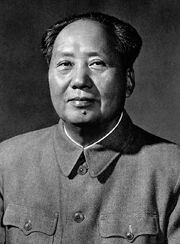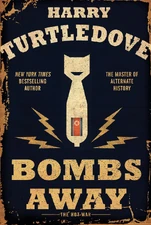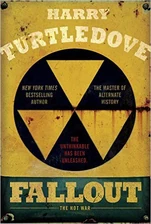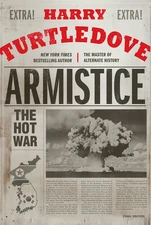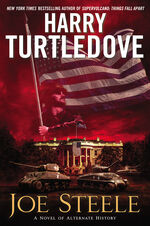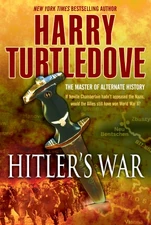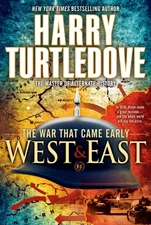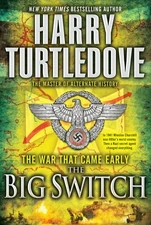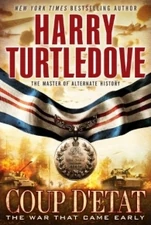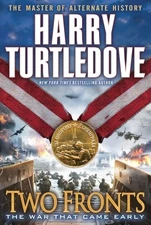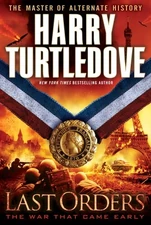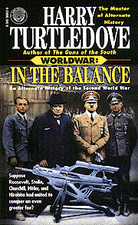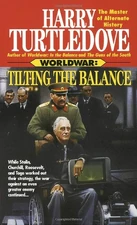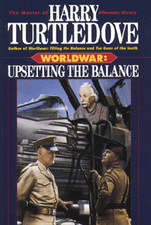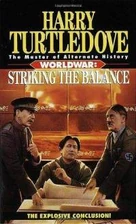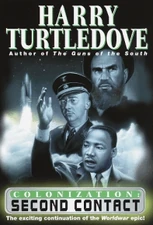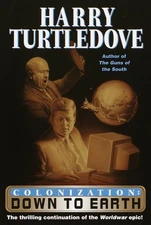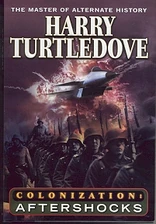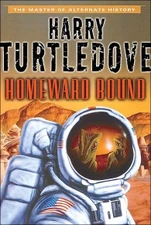No edit summary |
No edit summary |
||
| Line 28: | Line 28: | ||
{{The Hot War Historical Character |
{{The Hot War Historical Character |
||
|appearance = ''[[Bombs Away]]'';<br>''[[Fallout]]'';<br>''[[Armistice]]'' |
|appearance = ''[[Bombs Away]]'';<br>''[[Fallout]]'';<br>''[[Armistice]]'' |
||
| − | |type of appearance = Contemporary references|political office={{CommunistRulersFictional|Leader of the [[Chinese Communist Party (The Hot War)|Chinese Communist Party]]}} |
+ | |type of appearance = Contemporary references|political office={{CommunistRulersFictional|Leader of the [[Chinese Communist Party (The Hot War)|Chinese Communist Party]]}}}}In October 1950, '''Mao Tse-Tung''' intervened in the [[Korean War (The Hot War)|Korean War]] and dispatched [[China (The Hot War)|Chinese]] troops to aid [[North Korea (The Hot War)|North Korea]] after [[United Nations (The Hot War)|UN]] troops crossed the 38th Parallel. The Chinese intervention completely surprised the UN forces. The Chinese troops succeeded in cutting off three divisions of [[United States of America (The Hot War)|U.S.]] troops between the [[Chosin Reservoir (The Hot War)|Chosin Reservoir]] and [[Hungnam (The Hot War)|Hungnam]], and throughout November 1950, those U.S. troops were destroyed.<ref>''[[Bombs Away]]'', pgs. 3-7.</ref> |
| − | }}In October 1950, '''Mao Tse-Tung''' intervened in the [[Korean War (The Hot War)|Korean War]] and dispatched [[China (The Hot War)|Chinese]] troops to aid [[North Korea (The Hot War)|North Korea]] after [[United Nations (The Hot War)|UN]] troops crossed the 38th Parallel. The Chinese intervention completely surprised the UN forces. The Chinese troops succeeded in cutting off three divisions of [[United States of America (The Hot War)|U.S.]] troops between the [[Chosin Reservoir (The Hot War)|Chosin Reservoir]] and [[Hungnam (The Hot War)|Hungnam]], and throughout November 1950, those U.S. troops were destroyed.<ref>''[[Bombs Away]]'', pgs. 3-7.</ref> |
||
In response, U.S. [[President of the United States (Other Presidents)|President]] [[Harry Truman (The Hot War)|Harry Truman]] authorized General [[Douglas MacArthur (The Hot War)|Douglas MacArthur]] to use [[Atomic bomb (The Hot War)|atomic weapons]] in China if they were the only way to improve the situation.<ref>Ibid., pg. 41.</ref> That decision was made on 23 January 1951, and the U.S. bombed several strategic positions in [[Manchuria (The Hot War)|Manchuria]].<ref>Ibid., pg. 61.</ref> In response, Mao convinced his ally, [[Joseph Stalin (The Hot War)|Joseph Stalin]], to launch atomic attacks on U.S. allies in Europe, beginning [[World War III (The Hot War)|World War III]].<ref>Ibid., pg. 67.</ref> |
In response, U.S. [[President of the United States (Other Presidents)|President]] [[Harry Truman (The Hot War)|Harry Truman]] authorized General [[Douglas MacArthur (The Hot War)|Douglas MacArthur]] to use [[Atomic bomb (The Hot War)|atomic weapons]] in China if they were the only way to improve the situation.<ref>Ibid., pg. 41.</ref> That decision was made on 23 January 1951, and the U.S. bombed several strategic positions in [[Manchuria (The Hot War)|Manchuria]].<ref>Ibid., pg. 61.</ref> In response, Mao convinced his ally, [[Joseph Stalin (The Hot War)|Joseph Stalin]], to launch atomic attacks on U.S. allies in Europe, beginning [[World War III (The Hot War)|World War III]].<ref>Ibid., pg. 67.</ref> |
||
| Line 62: | Line 61: | ||
==Mao Tse-Tung in "[[The Phantom Tolbukhin]]"== |
==Mao Tse-Tung in "[[The Phantom Tolbukhin]]"== |
||
| ⚫ | {{The Phantom Tolbukhin Historical Character|type of appearance=Contemporary reference}}By 1947, '''Mao Tse-Tung's''' [[Chinese Communist Party|Red Chinese]] continued to struggle against [[Japan (The Phantom Tolbukhin)|Japanese]] occupation, much as [[Fedor Tolbukhin (The Phantom Tolbukhin)|Fedor Tolbukhin's]] [[Fourth Ukrainian Front (The Phantom Tolbukhin)|Fourth Ukrainian Front]] did against the [[Germany (The Phantom Tolbukhin)|Germans]].<ref>''[[Alternate Generals]]'', p. 125, ''[[Counting Up, Counting Down]]'', p. 116.</ref> |
||
| − | {{The Phantom Tolbukhin Historical Character|type of appearance=Contemporary reference}} |
||
| ⚫ | By 1947, '''Mao Tse-Tung's''' [[Chinese Communist Party|Red Chinese]] continued to struggle against [[Japan (The Phantom Tolbukhin)|Japanese]] occupation, much as [[Fedor Tolbukhin (The Phantom Tolbukhin)|Fedor Tolbukhin's]] [[Fourth Ukrainian Front (The Phantom Tolbukhin)|Fourth Ukrainian Front]] did against the [[Germany (The Phantom Tolbukhin)|Germans]].<ref>''[[Alternate Generals]]'', p. 125, ''[[Counting Up, Counting Down]]'', p. 116.</ref> |
||
==Mao Tse-Tung in [[Joe Steele (novel)|''Joe Steele'']]== |
==Mao Tse-Tung in [[Joe Steele (novel)|''Joe Steele'']]== |
||
Revision as of 08:01, 21 September 2020
| ||||||||||||||||||||||||||||||
Mao Tse-tung (Pinyin Mao Zedong; Chinese 毛泽东; 26 December 1893 – 9 September 1976) was a Chinese military and political leader who led the Chinese Communist Party (CPC) to victory against the Kuomintang (KMT) in the Chinese Civil War, and was the leader of the People’s Republic of China (PRC) from its establishment in 1949 until his death in 1976. His theories and military strategies and political policies are collectively known as Maoism or Marxism–Leninism–Maoism.
Born the son of a wealthy farmer in Shaoshan, Hunan, Mao developed a Chinese nationalist and anti-imperialist outlook in early life, adopting Marxism–Leninism while working at Peking University. He became a founding member of the Communist Party of China, leading the Autumn Harvest Uprising in 1927. During the Chinese Civil War between the KMT and the CPC, Mao helped to found the Chinese Workers' and Peasants' Red Army, led the Jiangxi Soviet's radical land policies and ultimately became head of the CPC during the Long March. Although the CPC temporarily allied with the KMT under the United Front during the Second Sino-Japanese War (1937–1945), after Japan's defeat China's civil war resumed and in 1949 Mao's forces defeated the Nationalists who withdrew to Taiwan.
On 1 October 1949 Mao proclaimed the foundation of the People's Republic of China (PRC), a single-party state controlled by the CPC. In the following years Mao solidified his control through land reforms and through a psychological victory in the Korean War, and through campaigns against landlords, people he termed "counter-revolutionaries", and other perceived enemies of the state. In 1957 he launched a campaign known as the Great Leap Forward that aimed to rapidly transform China's economy from an agrarian economy to an industrial one. This campaign led to the deadliest famine in history and the deaths of more than 15 million people. In 1966, he initiated the Great Proletarian Cultural Revolution, a program to remove "counter-revolutionary" elements of Chinese society that lasted 10 years and which was marked by violent class struggle, widespread destruction of cultural artifacts and unprecedented elevation of Mao's personality cult and which is officially regarded as a "severe setback" for the PRC.
In 1972, Mao met with United States President Richard Nixon in Beijing, which began the political opening of China. Mao suffered a series of heart attacks in 1976 and died at the age of 82 on 9 September. Mao was succeeded as paramount leader by Chairman Hua Guofeng (1976–1978), who was quickly sidelined and replaced by Deng Xiaoping.
A controversial figure, Mao is regarded as one of the most important individuals in modern world history. Supporters credit him with driving imperialism out of China, modernizing China and building it into a world power, promoting the status of women, improving education and health care. Conversely, his autocratic totalitarian regime has been vastly condemned for overseeing mass repressions and destruction of religious and cultural artifacts and sites, which through arbitrary executions, purges and forced labor caused an estimated 40 to 70 million deaths.
Mao Tse-Tung in The Hot War
| The Hot War POD: November, 1950 | |
| Appearance(s): | Bombs Away; Fallout; Armistice |
| Type of Appearance: | Contemporary references |
| Political Office(s): | Leader of the Chinese Communist Party |
In October 1950, Mao Tse-Tung intervened in the Korean War and dispatched Chinese troops to aid North Korea after UN troops crossed the 38th Parallel. The Chinese intervention completely surprised the UN forces. The Chinese troops succeeded in cutting off three divisions of U.S. troops between the Chosin Reservoir and Hungnam, and throughout November 1950, those U.S. troops were destroyed.[1]
In response, U.S. President Harry Truman authorized General Douglas MacArthur to use atomic weapons in China if they were the only way to improve the situation.[2] That decision was made on 23 January 1951, and the U.S. bombed several strategic positions in Manchuria.[3] In response, Mao convinced his ally, Joseph Stalin, to launch atomic attacks on U.S. allies in Europe, beginning World War III.[4]
Despite the war in Europe, Mao focused on the fighting in Korea, insuring a steady flow of arms to the North Koreans.[5] To insure the flow remained steady, Mao pushed for rapid repairs to the places the U.S. had atom bombed. By April 1951, the rail line through Harbin was functional again.[6] For the remainder of 1951, Chinese and North Korean troops pushed south.[7] The lines stalemated south of Chongju, with the Americans and the Chinese intermittently taking shots at one another throughout June and July 1951.[8] This stalemate was broken when the Soviets dropped atom bombs on Pusan and Chongju in South Korea in August,[9] Chinese and North Korean troops poured through the hole the Soviet's had created,[10] driving UN troops south to Kaeryong,[11] where their stubborn resistance stabilized the lines once gain.[12]
For his own part, Mao realized that the U.S. would certainly do its best to kill him with an atomic bomb. He made a habit of staying in one town for a day or two at a time before moving on.[13] Joseph Stalin used a similar tactic. However, in June, 1952, American intelligence located Stalin in Omsk and deployed the new hydrogen bomb, killing Stalin and destroying Omsk.[14]
Despite this turn of events, Mao remained defiant, promising that the forces of revolution would be victorious.[15] However, NATO attacks on North Korean and Chinese infrastructure began taking a toll. In August, 1952, the Chinese government approached the government of Yugoslavia to open up talks with the U.S. While Marshal Tito was a "deviationist" in Mao's eyes, Yugoslavia was one of the handful of countries to maintain relations with both the U.S. and the P.R.C.
Chinese Foreign Minister Chou En-Lai proposed a return to the status quo ante bellum in Asia if the U.S. ended its bombing campaign against China. Chou further promised that North Korea would withdraw its forces north of the 38th Parallel. Yugoslavian Foreign Minister Edvard Kardelj met with President Truman in Philadelphia with Chou's proposal. Satisfied that Kim would withdraw, Truman accepted Chou's plan, and the war officially ended on all fronts.[16]
Mao Tse-Tung in Worldwar
| Worldwar POD: May 30, 1942 | |
| Appearance(s): | Upsetting the Balance through Aftershocks |
| Type of Appearance: | Direct |
| Military Branch: | People's Liberation Army (World War II, Race Invasion of Tosev 3) |
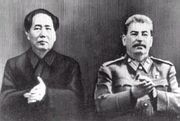
Joseph Stalin provided Mao with much support as he continued his struggle against the Race in China after the Peace of Cairo.
Mao Tse-Tung was the leader of the Chinese Communist Party and for all intents and purposes, the People's Liberation Army. As such, he was a critical leader of resistance to first the invading Japanese from 1937 on, and then against the Race when its Conquest Fleet invaded in 1942.
Prior to 1942, Mao, in addition to fighting Japan, had been locked in a war with China's official leader, Chiang Kai-Shek. The threat the Race posed was too great to allow Mao to continue fighting Chiang, and he made common cause with the Nationalists, and even with Japanese forces stranded in China. The popular front did not preserve China's independence; it was overrun effectively by the Race.[17] Still, Mao sought to assert his himself, even ordering aid Nieh Ho-Ting to demand the PLA inclusion at peace talks in Cairo.[18] This demand was rejected preemptorily by the Race.[19] Even after Nieh, on Mao's orders, suggested that the PLA would get its hands on an explosive-metal bomb, the Race did not yield.[20] In response to the slight, Mao adopted a proposal by Liu Han the PLA launch a series of hard-hitting attacks against the Race, a reminder to the aliens that they would not rule China indefinitely.[21]
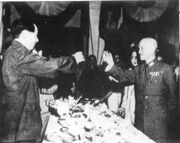
Like so many old enemies, Mao and Chiang Kai-Shek were forced to unite in their opposition to the Race's presence in China. Here they celebrate the liberation of Peking
This plan set the tone for Chinese resistance for the decades that followed, making China one of the most restive Race Colonies on Tosev 3. The Communists took the lead, with tremendous material support from the Soviet Union (though Mao strongly distrusted Joseph Stalin and found Vyacheslav Molotov even harder to work with, a feeling that was mutual; Molotov was more than willing to cut Mao off if it helped the USSR.)[22]. He was also helped by the United States when the USSR proved unreliable.[23]
In 1963, Mao's forces temporarily expelled the Race from Peking, Shanghai, and other Chinese cities with the help of other Chinese factions.[24] They were not able to hold the cities long.[25] After a second more successful rebellion in 1965 using shoulder fired missiles,[26] they were able to force the Race's authorities to treat with them diplomatically,[27] though mutual distrust hampered the negotiations. The Race refused to recognize China as independent in the territory it controlled, fearing it would be the beginning of the end of their rule on Earth if they did.[28] Mao's forces still held Peking into 1966[29] but were ultimate defeated. Still, rebellion continued to simmer in China in the decades that followed.[30]
Despite being a very effective guerrilla leader, Mao never attained his ultimate goal: the possession of an explosive-metal bomb.
Mao Tse-Tung in The War That Came Early
| The War That Came Early POD: July 20, 1936; Relevant POD: September 29, 1938 | |
| Appearance(s): | Hitler's War; The Big Switch |
| Type of Appearance: | Contemporary references |
Mao Tse-Tung was fighting an effective guerrilla war against the Japanese forces that occupied China, although his supporters both foreign and domestic tended to be fellow Communists.[31][32]
In early 1939, Corporal Pete McGill of the United States Marine Corps learned that Mao had a taste for sex with very young women. McGill thought the information might come in handy later, and so passed it along to his superiors.[33]
Mao Tse-Tung in "The Phantom Tolbukhin"
| "The Phantom Tolbukhin" POD: c. 1937 | |
| Type of Appearance: | Contemporary reference |
By 1947, Mao Tse-Tung's Red Chinese continued to struggle against Japanese occupation, much as Fedor Tolbukhin's Fourth Ukrainian Front did against the Germans.[34]
Mao Tse-Tung in Joe Steele
| Joe Steele POD: 1878; Relevant POD: July, 1932 | |
| Novel or Story?: | Both |
| Type of Appearance: | Contemporary reference |
Mao Tse-Tung was a Chinese Red who led a civil war against the government of Chiang Kai-Shek before, during and after World War II, including the period when Japan had invaded China.[35] In August 1945, the Soviet Union pushed Japan out of China. However, Soviet Premier Leon Trotsky ensured that Manchuria went to Mao.[36] Throughout the remainder of the 1940s, Mao gained on Chiang's forces,[37] until, in October 1949, just two months after the end of the Japanese War, Mao and his Reds pushed Chiang's forces off of the Chinese mainland.[38]
The U.S. had backed Chiang, and refused to recognize Mao. For a time, U.S. President Joe Steele had considered using atomic bombs to support Chiang, as they'd effectively ended the Japanese War. However, the Soviet ambassador to the U.S., Andrei Gromyko, suggested that any U.S. atomic attack in China might be met with a Soviet atomic attack in Europe.[39]
Literary comment
Mao is only referenced once in the short story, but his role is identical to the novel, and OTL, for that matter.
Mao Tse-Tung in State of Jefferson
| State of Jefferson POD: Pre-history; Relevant POD: 1919 | |
| Appearance(s): | "Typecasting" |
| Type of Appearance: | Posthumous reference |
Mao Tse-Tung led China's conquest of Tibet in 1959. One effect of this was a diaspora of yetis.
References
- ↑ Bombs Away, pgs. 3-7.
- ↑ Ibid., pg. 41.
- ↑ Ibid., pg. 61.
- ↑ Ibid., pg. 67.
- ↑ Ibid., pg. 204-205.
- ↑ Ibid., pgs. 323.
- ↑ Ibid., pgs. 311-315.
- ↑ Fallout, loc. 197-268.
- ↑ Ibid., loc. 2152-2213.
- ↑ Ibid., loc. 2302.
- ↑ Ibid., loc. 2503.
- ↑ Ibid., loc. 2562.
- ↑ Ibid., pg. 187, HC.
- ↑ Armistice, pgs. 72-78, ebook.
- ↑ Ibid., pg. 86.
- ↑ Ibid., pgs 277-280, ebook.
- ↑ See, In the Balance through Upsetting the Balance, generally.
- ↑ Striking the Balance, pg. 343.
- ↑ Ibid.
- ↑ Ibid., at pg. 344.
- ↑ Ibid., pgs. 458-460.
- ↑ Second Contact, e.g. at pg. 17, 109.
- ↑ Ibid., pg. 163.
- ↑ Ibid., pgs. 581-582.
- ↑ Down to Earth, pg. 100, 168-178.
- ↑ Aftershocks, pgs. 447-491.
- ↑ Ibid., pg. 491.
- ↑ Ibid., pg. 492.
- ↑ Ibid., pgs. 570-575.
- ↑ Homeward Bound, pg. 36, HC.
- ↑ Hitler's War, pg. 449.
- ↑ The Big Switch, pg. 303, tpb.
- ↑ Ibid., pg. 451.
- ↑ Alternate Generals, p. 125, Counting Up, Counting Down, p. 116.
- ↑ Joe Steele, pg. 325.
- ↑ Ibid.
- ↑ Ibid., pg. 358.
- ↑ Ibid., pg. 376.
- ↑ Ibid, pg. 376-377.
| Titles and Succession | |||||||||||||||||||||||||||||||||||||||||||||
|---|---|---|---|---|---|---|---|---|---|---|---|---|---|---|---|---|---|---|---|---|---|---|---|---|---|---|---|---|---|---|---|---|---|---|---|---|---|---|---|---|---|---|---|---|---|
| |||||||||||||||||||||||||||||||||||||||||||||
| |||||||||||||||||||||||||||||||||||||||||||||||||||||||||||||||||||||||||||||||||||||||||||||||||||||||||||||||||||||||||||
